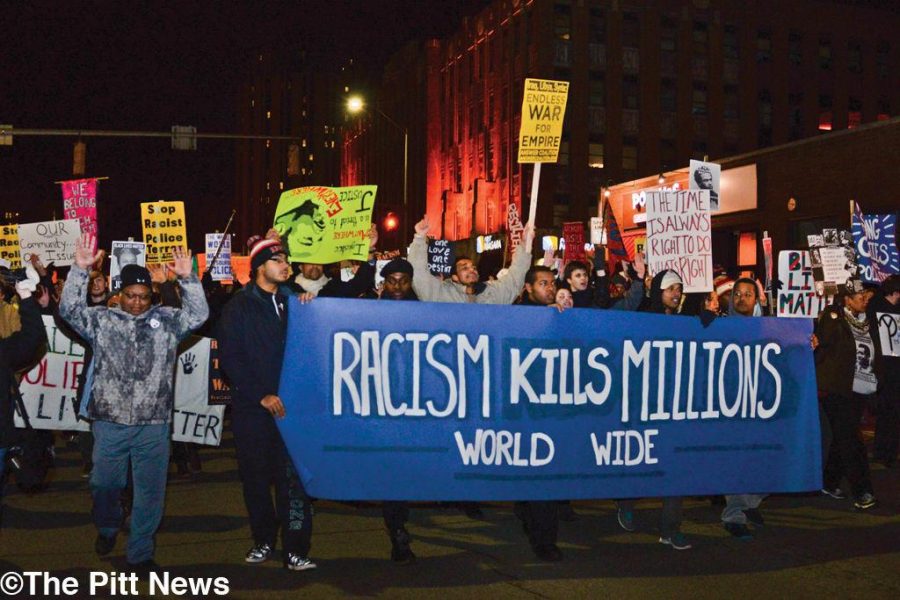Chasing a Dream: Protesters march Pittsburgh for equality
January 20, 2015
People of Pittsburgh banded together Sunday night for a 1,000-member march, traveling 2.5 miles through the cold from Oakland to Downtown Pittsburgh, to honor Martin Luther King Jr. and protest racism.
The crowd members, many of which were bundled up in coats and hats, held signs with gloved hands that displayed “I’ll die for the cause, but please don’t make me” and “Solidarity, not silence.”
We Change Pittsburgh, an activist group, began organizing the 6 p.m. march more than a month ago. Pittsburgh police accompanied the protesters on bicycles and motorcycles, and police vehicles were parked along the route to close down streets. Officers did not interfere with the protests.
We Change Pittsburgh activist Julia Johnson began the rally on Bigelow Boulevard with a moment of silence for worldwide police brutality. The marchers gathered on Bigelow Boulevard and Fifth Avenue.
“Being here is a responsibility of our country. As a white person, I can’t be comfortable, and as a student, I have the power to affect change,” said Hannah Weintraub, an undeclared freshman. “It feels amazing [here]. It feels like part of the community is coming together.”
The marchers moved down Fifth Avenue, chanting “Hands up, don’t shoot,” “Show me what democracy looks like” and “Fists up, fight back.” The march featured African and Brazilian drummers, hip-hop artists and poetry.
“We are here to honor and celebrate the life of Dr. King, and the work he started is going to require the work of everyone involved now,” said We Change Pittsburgh activist Michelena Wolf, 43, of Franklin Park.
We Change Pittsburgh joined with 45 other organizations in the Pittsburgh area to lead the march.
“There’s a lot of really good black people here doing really good things. They’re mentoring me,” Wolf, who is white, said.
The rally continued with more speakers reiterating the idea that the cause was about more than just black lives in the United States.
Taylor Goel, a member of the Act Now to End War and Stop Terrorism Coalition, or ANSWER, a national activist group, said the march was “about connecting issues at home and abroad.” ANSWER condemns the evils of imperialist wars and capitalism.
Other community organizers and activists had the same message, speaking for solidarity with those in the Palestinian territory, Iraq and Ferguson, Mo., as well as victims of gentrification and the prison system who, many speakers said, they felt were all being exploited by “white supremacist America.”
The overlap of issues has even strengthened the movement, according to Alana Fields, a first-year sociology graduate student.
“People are beginning to realize that everything is connected. And, when we all unite, that’s what’s going to make the movement go somewhere,” Fields said. “You see everyone at this march, old, young, white, black, foreign. It doesn’t seem like a disjointed movement at all.”
The mixture of students, residents, activists, children and organizations held signs that read, “I am Ferguson, I am Gaza, I am Human” and “The World is Watching Pittsburgh Police.” A group of people holding light-up letters spelling, “End White Silence” took up the back of the crowd.
Pastor Shanea Leonard, of the Judah Fellowship Christian Church in the North Side, marched near the front of the crowd with a sign that read, “Without justice, there can be no love.” She said young people in particular should crusade against injustice.
“Realize that it’s young people who make a difference,” Leonard said. “Dr. King was in his 20s when he led the movement.”
Johnson addressed the crowd at the City-County Building on Grant Street with the same message, urging students to learn from the movement and its participants, but also “unlearn racism.”
Pete Shell, a member of the Committee who has experience putting on antiwar protests and helped organize the march with We Change Pittsburgh, was proud that “white and black folks came out to fight together.”
“Don’t limit your vision. We just saw the biggest march against police brutality since 1996,” Shell said, referring to the last large anti-racism march in Pittsburgh, which was in defense of Jonny Gammage, a motorist who suffocated to death after struggling with five police officers during a traffic stop in 1996, and against police brutality.
The crowd reached the City-County Building at approximately 8:07 p.m. Five minutes later, the crowd went hush, except for helicopters circling above the city, as the protestors observed a second moment of silence. Johnson ended the silence, chanting “No justice, no peace, no racist police.”
Johnson urged the protesters to return to the City-County Building on Tuesday at 10 a.m. for the Pittsburgh City Council meeting. Organizers plan to express their frustrations to Pittsburgh’s City officials and to look at the coalition’s two-page-long list of demands for city government, such as an end to all forms of discrimination and the full recognition of human rights, available on the We Change Pittsburgh website.
“Black lives matter, but this justice system doesn’t do a thing for us,” Johnson said.








